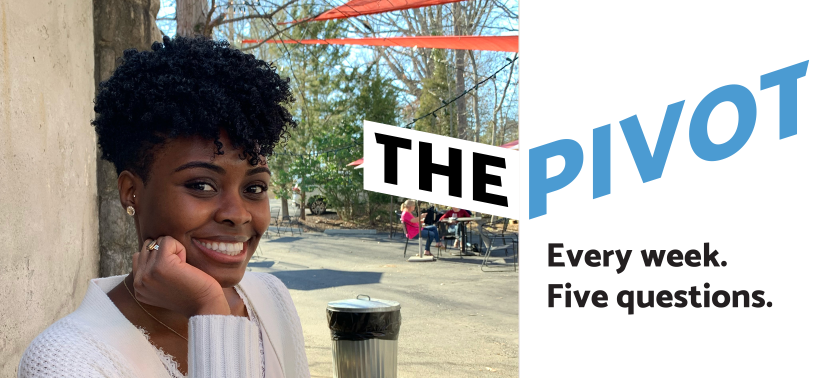
Jeliyah Clark strives to makes science accessible to new audiences.

What’s your role in public health?
I’m pursuing a doctoral degree in environmental sciences and engineering with an epidemiology minor. I’ve been working in the lab of Dr. Rebecca Fry. I came to the Gillings School in 2014 to get my Bachelor of Science in Public Health, and I’ve just gotten more passionate about sharing my love of science and public health with others. That’s why I helped to establish the Undergraduate Research Opportunities Program, which aims to increase the number of students from underrepresented backgrounds pursuing research in the environmental health sciences.
While I am still training to be a public health expert, I hope to serve as a bridge between the scientific community and the general public, especially underserved populations. Right now, I think this includes developing stronger scientific communication skills, trying my best to think critically about who might be excluded from the benefits of my research and how to best target upstream determinants, and learning to become as great of a mentor to future researchers as the ones I’ve been blessed with along my journey. This includes Dr. Fry in the Department of Environmental Sciences and Engineering, Drs. Richard Watkins and Noelle Romero from the Chancellor’s Science Scholars Program, Jonathan Earnest and Dr. Leah Frierson from the Ronald E. McNair Scholars Program, and Dr. Chantel Martin from the Department of Epidemiology.

Can you describe your focus area in one sentence?
Can prenatal B-vitamin intake protect developing babies from the harms of arsenic exposure?
In October 2020, I won UNC’s 3-Minute Thesis competition with a presentation called, “Eating for Two: Mother’s Diet as an Intervention for Arsenic-Induced Lower Birth Weight.”

What brought you to public health?
Growing up, I became aware of the intersections between race, income and health from firsthand experiences. After visiting Gillings as part of the summer public health symposium for high school students, I gained context and the vocabulary to better articulate my interest in improving access to health care. I knew from then on that I wanted to study health policy and management, with the ultimate goal of effecting change through health policy.
The transition to epidemiology began with my acceptance to the Chancellor’s Science Scholars (CSS) Program. CSS promotes diversity in science, technology, engineering and mathematics (STEM) fields by supporting students from underrepresented backgrounds in their pursuit of doctoral and medical degrees. As part of this endeavor, the program requires scholars to major in STEM disciplines. During my first year of college, I transitioned from health policy and management to biology to fulfill the scholarship requirements.
I found that biology taught me how diseases develop — but it never addressed the root causes of health disparities. Biology piqued my interest in underlying disease mechanisms, but I still found myself more interested in understanding why certain groups were exposed to toxins and disease agents in the first place. Toward the end of my undergraduate career, I returned to the Gillings School to study environmental health sciences while simultaneously conducting research in the lab of Dr. Rebecca Fry.

How have you pivoted in response to the coronavirus pandemic?
Given that I am working from home, the pandemic has challenged me to draw clearer boundaries between work and my personal life. I miss seeing my lab members and classmates on campus, but I’ve enjoying meeting and engaging with the larger scientific community through #AcademicTwitter. (You can follow me at @liyahclarks!)

Who are you when you’re at home?
I am an introvert who finds joy in candles, rainy days and all things cozy.
